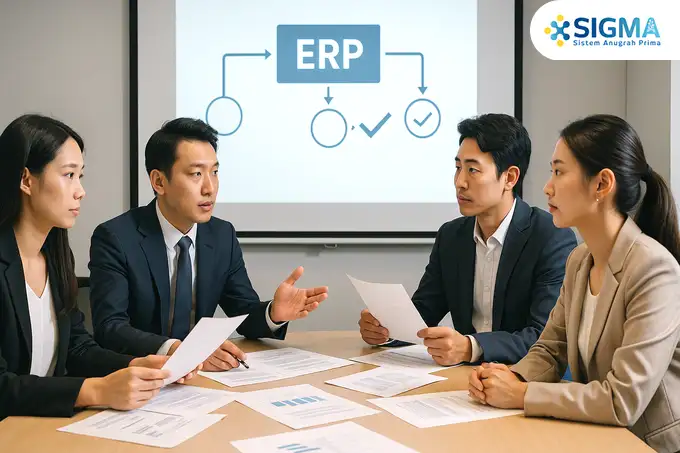If you’re immersed in the manufacturing world, you’re all too familiar with the headache of managing production. From delayed raw materials and idle machinery to chaotic production schedules and substandard finished goods — it all inevitably leads to financial loss.
But you’re not alone. Many manufacturing companies face similar hurdles. The solution? A robust Enterprise Resource Planning (ERP) system — but not just any ERP. You need an ERP software tailored for manufacturing, one purpose-built for the unique dynamics of your industry.
Let’s explore — in a clear, no-nonsense manner — how manufacturing ERP can become your “secret weapon” for streamlining production. We’ll uncover essential features and how to choose the right system so your investment yields tangible returns.
Why Does Manufacturing Demand a Specialized ERP System?
Imagine this: manufacturing is inherently complex — involving tightly interlinked processes such as raw material procurement, inventory management, production planning, quality control, and finished goods delivery. Relying on manual methods or fragmented systems is a recipe for chaos.
Generic ERP solutions might cover finance and HR, but when it comes to the shop floor, you need more. Manufacturing ERP systems are designed to understand and automate factory-specific workflows, such as:
- Production Planning: Ensuring you have the right materials, machine capacity, and labor to meet demand.
- Raw Material & Finished Goods Inventory Management: Preventing production halts due to stockouts or overstocked warehouses.
- Quality Control: Guaranteeing every product meets your standards and can be traced back if issues arise.
- Machine & Resource Optimization: Maximizing machine utilization and reducing downtime.
- Cost of Production: Accurately calculating Cost of Goods Manufactured (COGM).
Without a tailored ERP, inefficiencies, delays, and hidden costs will continue to plague your operations.
Must-Have Features in a Manufacturing ERP: Non-Negotiables
Now, let’s dive into the essential features your ERP system must include. These are not “nice to have” — they are mission-critical:
1. Bill of Materials (BOM) Management
- What is it? A complete recipe listing all raw materials, components, and sub-assemblies required to manufacture one unit of a product — including quantities and sequence.
- Why It’s Crucial: Without an accurate BOM, you can’t plan material purchases, estimate production costs, or ensure quality. Your ERP must support multi-level BOMs.
2. Material Requirements Planning (MRP)
- What is it? The brain of production. MRP calculates:
- Which raw materials are needed
- How much is required
- When to purchase or produce
- Why It’s Crucial: Prevents material shortages and excess inventory. A strong MRP automatically generates purchase and work order recommendations.
3. Capacity Planning
- What is it? Analyzes machine and labor availability to determine if production schedules can be met. Identifies bottlenecks in advance.
- Why It’s Crucial: Avoid production plans that outpace your resources. Optimize manpower and equipment allocation.
4. Production Order Management
- What is it? Oversees the entire production order lifecycle — from issuing work orders and tracking progress to completing finished goods.
- Why It’s Crucial: Gain real-time insights into order status, bottlenecks, and completion rates.
5. Quality Control (QC)
- What is it? Manages quality standards, inspection records, defect tracking, and return/repair processes.
- Why It’s Crucial: Protect your brand. If quality issues arise, trace them to specific batches or raw materials.
6. Inventory & Stock Management
- What is it? Manages raw materials, work-in-progress (WIP), and finished goods — including locations, serial numbers, and inventory valuation.
- Why It’s Crucial: Real-time inventory visibility eliminates shortages and overstocking. Know what you have, where it is, and how much it’s worth.
7. Cost Management & COGM Calculation
- What is it? Accurately calculates per-unit production costs — including raw materials, direct labor, and overhead.
- Why It’s Crucial: You can’t set competitive prices or calculate profit margins without precise costing. A good ERP consolidates all cost elements.
8. Machine Integration (IoT-Ready)
- What is it? Connects ERP to production machines (via IoT) to collect real-time data on machine performance, uptime, and output.
- Why It’s Crucial: Unlocks advanced efficiency insights — identify underperforming or underutilized machines and act on data-driven optimizations.
Choosing the Right Manufacturing ERP Vendor: Be Selective

Choosing an ERP vendor is like choosing a long-term business partner. Be deliberate. Here’s what to look for:
1. Industry-Specific Experience
- Vendors familiar with manufacturing understand your challenges — they don’t just sell software; they deliver solutions.
- Ask: “How many manufacturing clients have you served? Can you share case studies or testimonials?”
2. Strong Implementation Team
- ERP implementation involves system customization, legacy data migration, and staff training. Your vendor must provide seasoned professionals.
- Ask: “What does the implementation roadmap look like? Is a dedicated project manager assigned? How is legacy data handled?”
3. Responsive After-Sales Support
- Software issues are inevitable. Ensure your vendor offers prompt, accessible support — preferably local.
- Ask: “What’s your support structure? What are your support hours? What’s your average response time for critical issues?”
4. System Flexibility & Scalability
- Your business will grow. Your ERP must scale — whether you add new modules, expand production, or open new plants.
- Ask: “Is the system modular? Can we easily add new functionalities or scale production without major disruptions?”
5. Total Cost of Ownership (TCO)
- Go beyond license fees. Consider implementation, training, customization, annual fees, maintenance, and future upgrades.
- Ask: “What are the total costs beyond initial licensing? Are there any hidden fees?”
6. User-Friendly Interface
- Even powerful systems fail if users struggle. The ERP should be intuitive and easy to learn, especially for factory-floor personnel.
- Ask for a demo: “Can we test the interface? What does the daily user experience look like?”
A Simple Case Study
A mid-sized electronics component factory faced:
- Frequent raw material delays, halting production lines
- Uncertainty about WIP inventory levels
- Rough cost estimates, resulting in inaccurate pricing
After deploying a tailored manufacturing ERP:
- MRP Activated: The system automatically flagged material reorder points, smoothing production flow.
- WIP Visibility: Real-time dashboards revealed how many units were in process at each workstation. Bottlenecks were instantly visible.
- Accurate COGM: Integrated data from raw materials, labor, and machine energy usage calculated per-unit costs automatically.
- Capacity Optimization: Machine usage trends highlighted overused vs. idle equipment, guiding smarter shift planning.
Result? Production efficiency increased by 20%, operational costs declined, and customer satisfaction improved thanks to on-time deliveries. Not magic — just ERP.
What’s Your Next Move?
Boosting manufacturing efficiency isn’t just about buying new machines — it’s about implementing smarter systems. Manufacturing ERP is a long-term investment with a significant impact on your bottom line.
If you’re struggling with inefficiencies, stock issues, or unreliable costing, it’s time to take ERP seriously. Don’t follow the trend — find a solution that truly fits your scale and needs.
Ready to eliminate inefficiencies and accelerate your manufacturing growth?
PT. Sistem Anugrah Prima (SIGMA) is your trusted partner in manufacturing ERP. With deep experience across Indonesian factories, we’ve helped manufacturers optimize their operations from end to end.
Our experts are not just developers — they understand manufacturing inside and out. We’re ready to listen, analyze your challenges, and craft the most suitable ERP solution for you.
Don’t let inefficiencies hold you back. Visit us at www.sistemanugrahprima.com or connect with our consultants today for a free discovery session. Discover how SIGMA’s ERP can become the catalyst for your plant’s profitability and efficiency.
Digital transformation isn’t a cost — it’s an investment. Let’s make your production dreams a reality.


